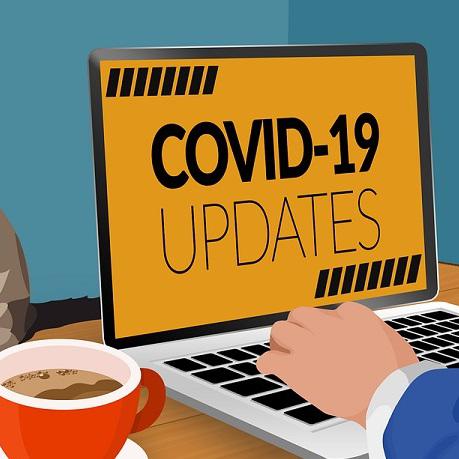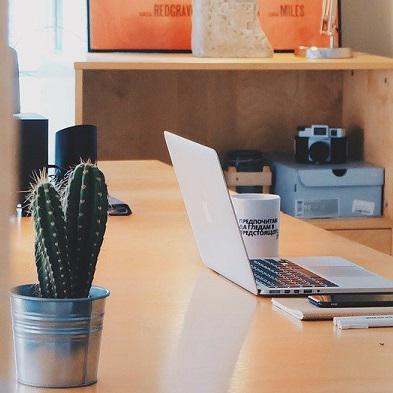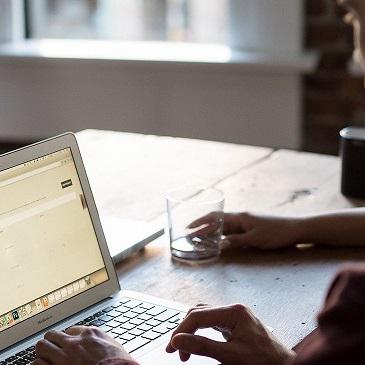Tips for Working From Home in the Age of Social Distancing
by Lorraine Grula

What a difference a virus can make!
All over the world, remote workers are isolating themselves full-time due to the outbreak of the novel coronavirus, COVID-19.
It takes a microscope to see this virus, but its impacts are anything but tiny.
Are you one of the millions of people who suddenly have to change their daily routines and work from home? Stay productive during conference calls and face-to-face video calls?
If so, this article is for you!
Survival Tips For a Working Hermit
Speaking as someone who has worked remotely out of the house for years, welcome to the club! I love it and don't need an international emergency to turn my living room into an office.
But for the newly initiated, it can seem quite odd, like you've been through the looking glass and not quite sure what is real anymore.
Here are the three best tips I have discovered over the years to be a productive, happy, and fulfilled working hermit.
- Change out of your PJs
- Make yourself some timekeeping mechanism, i.e., simulate a timeclock
- Be honest with yourself and your boss
Now let me explain the reasoning behind those tips since I know you're thinking they sound awful!
I Thought Lounging All Day In My Grubbies Was Part Of The Fun?
It is! Calm down. It's not called Google Hangout for nothing.
You do not have to change out of your pajamas and put on traditional work clothes. No, no, no! I say change out of your PJs and into your grubbies.
Office clothes are unnecessary unless you just really like pantyhose and high heels. I have known some people who work out of the house to prefer wearing office clothes because it helped them "get in the mood," so to speak. I am not one of those types. I can be remarkably productive in sweat pants and a t-shirt.
Even so, my point is to change clothes out of what you sleep in. Changing clothes helps you separate work time from playtime in your mind. This is actually important for maintaining productivity.
Humans are very ritualistic. Most of us find it necessary to compartmentalize our work life from our personal life. Working out of the house can make this way more complicated. Simple things like changing out of your PJs can help, but no one says you can't wear something just as comfy.
Simulate a Timeclock
If there is anything most workers want to leave behind at the office, it's the time clock! So what a party-pooper I am to suggest making one for your home office!
Guilty as charged! Honestly, if you want to be genuinely productive, you have to set real work hours, just like when you work in an office.
I use a notebook and a pen. I write down when I start when I stop. I clock out when I take even the slightest break. I add it all up and hold myself accountable.
MAKE YOURSELF work; however many hours you should work. I give myself plenty of breaks, but don't quit for the day until I've got it all done. I still force myself to burn the midnight oil if necessary.
I found that unless I watched my work time closely, I would significantly misjudge. I was wondering why I wasn't getting much done!
Then I found out. It seemed like I was working! Oops. Which brings me to tip #3.
Be Honest With Yourself and Your Boss
Companies can be reluctant to allow remote work because they are afraid no one will get any work done! Who wants to fill out accounting spreadsheets when the TV is calling from the other room? After multiple calls and video conferencing a little social media seems so tempting, doesn't it?
Working from home during the coronavirus pandemic takes responsibly, maturity, and discipline. Work still has to get done, and you are the only one to make it happen!
I sometimes actually imagine some of my former bosses screaming bloody murder at me to get busy. I laugh and express my gratitude that it is just a virtual conversation. Then I get busy because I know the old goat is right.
Why Is The World Freaking Out?
Most of us are a bit tired of hearing about COVID-19, but things are just getting started, so the topic isn't going away anytime soon.
There seems to be a distinct split in public opinion. Some folks are claiming this is nothing but hysteria, so they are defiantly going about ordinary life. Others seem petrified the world is about to end.
So What's Really True?
As confusion and controversy swirl, let's turn to the science of epidemiology. Epidemiology is the branch of medicine that studies how sickness spreads. How many people get sick, and how did they get sick? Their goal, of course, is to minimize and control the spread of disease.
Epidemiologists have been warning the world about the likelihood of a viral epidemic for decades now. Viruses mutate to form new viruses all the time. Occasionally, the new mutant virus is particularly dangerous, so the medical community raises the red flag.
The COVID-19 virus has most of the characteristics epidemiologists have been worried about. It spreads easily. It has a high morbidity rate. It has a long incubation period where you can spread it without even knowing you have it.
Although the news coverage can seem over the top and excessive, there truly is no doubt that this virus is uniquely dangerous.
Stay Home!
So tamping down the spread by keeping isolated is the best strategy for long term health. That does not mean there won't be hardships.
I encourage you to stay hunkered down and learn to enjoy the freedom to belch or take a break whenever you need to. That's the real joy of homebound living.
Turn To Online Learning
All of this unprecedented downtime opens up the opportunity for checking things off your list that you didn't think you'd have the time to get to.
You can learn a new skill, pick up a hobby, or connect with friends and family that you haven't been able to catch up with.
Learn to play the Ukelele. Bake an upside-down pineapple cake. Get around to those SAP training videos you've been putting off and make yourself more competitive in the job market.
by Lorraine Grula
More Blogs by Lorraine Grula

How To Manage Staff When You Are Finally Together Again
When COVID-19 abruptly changed the world, businesses had to adapt. Rem...

Job Prospects Increase With Hands-on SAP Experience...
What's the first thing a job recruiter would ask a person looking ...

Time To Change Out of Your PJs - Getting Back to Work...
When COVID-19 abruptly changed the world, businesses had to adapt. Rem...
Related Blogs

Working from home? 10 Expert Tips To Make It Work For...
Are you self-isolating, or out of necessity, now working from a ho...

Twelve Hacks For Managing Your Calendar
One thing that can really take up too much time (aside from email) is ...
.png)


